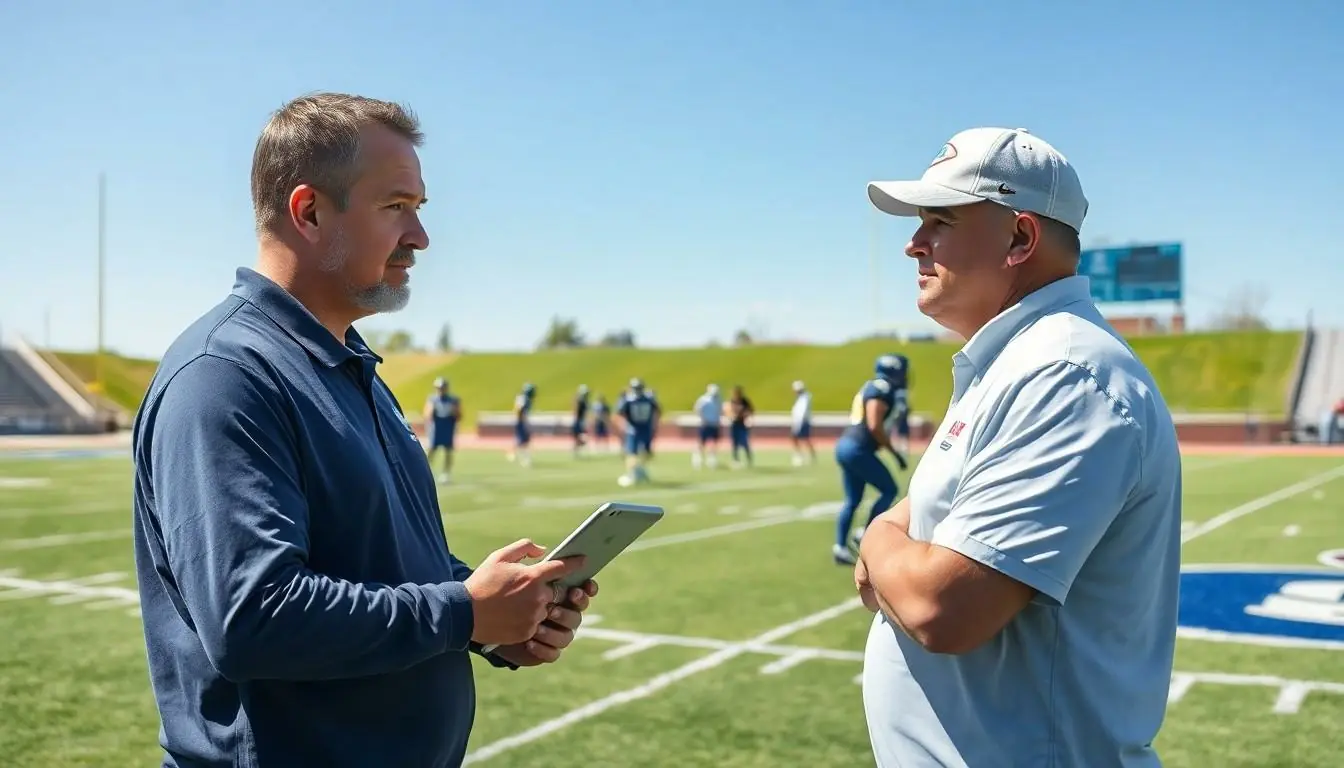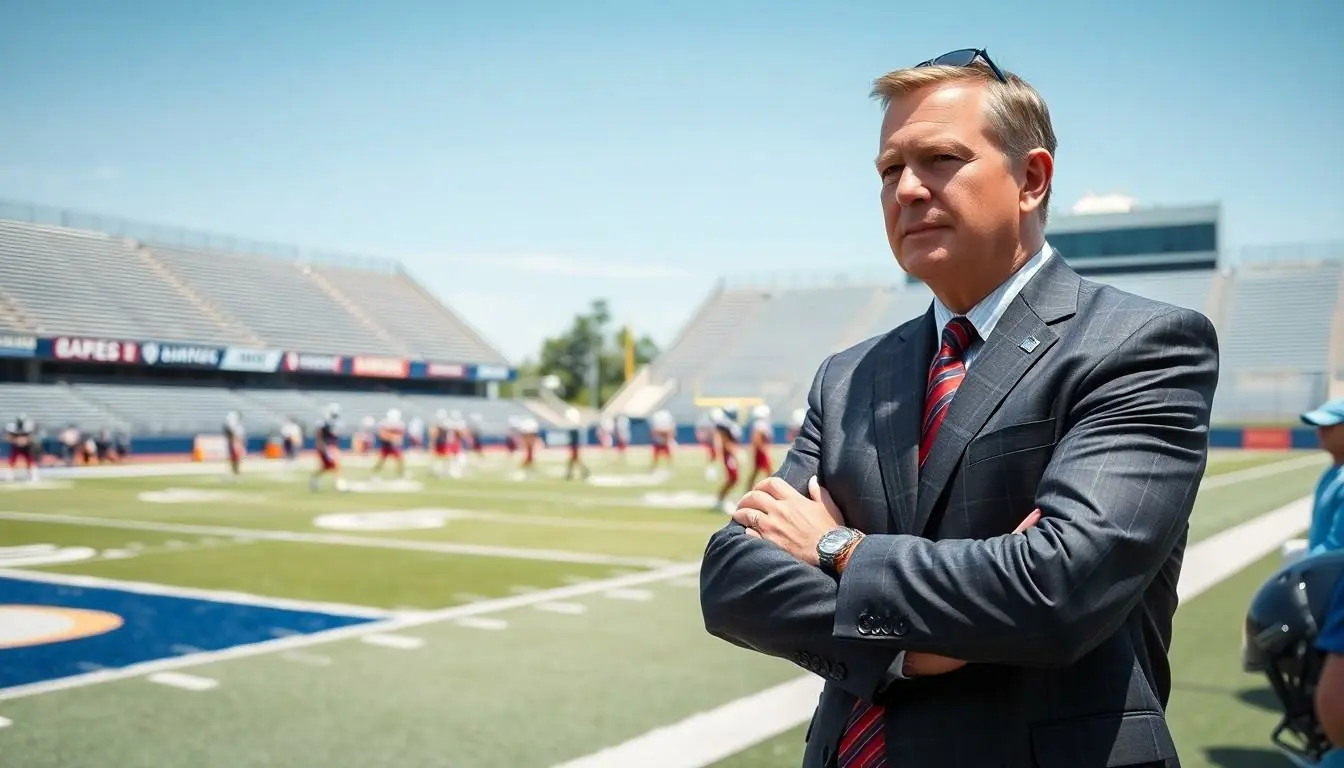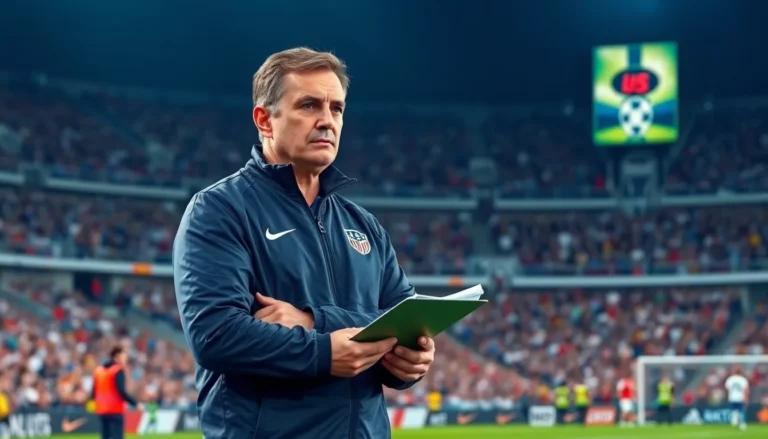In the high-stakes world of college football, the general manager is the unsung hero, orchestrating the symphony behind the scenes. While fans cheer for touchdowns and tackles, it’s the GM who crafts the strategy, manages the roster, and navigates the chaotic transfer portal like a pro. Think of them as the football wizard, conjuring up winning teams while dodging the occasional media blitz.
But what exactly does a college football general manager do? It’s not just about collecting talent like Pokémon cards. They juggle budgets, negotiate contracts, and sometimes even play therapist for stressed-out coaches. With the pressure to build a championship contender, these GMs are the backbone of any successful program. Buckle up as we dive into the fascinating world of college football management, where every decision could lead to glory or a very long offseason.
Table of Contents
ToggleRole of a College Football General Manager
The college football general manager (GM) plays a significant role in enhancing team performance. GMs engage in various strategic areas, contributing to both team building and overall success.
Key Responsibilities
Managing player rosters is a primary responsibility for GMs. They evaluate talent through recruiting efforts and monitor player development, ensuring the team remains competitive. Navigating the transfer portal requires careful assessment of players and compliance with NCAA regulations. Budget management also falls under the GM’s purview, as they allocate funds efficiently for scholarships, facilities, and operational costs. Negotiating contracts for coaches and players ensures strong relationships within the program. GMs support coaches by providing resources and addressing their needs, fostering an environment conducive to winning.
Skills Required
Analytical skills are essential for a college football GM. They must analyze game statistics, player performances, and market trends, allowing for informed decision making. Strong communication skills enable them to interact effectively with coaches, players, and administrative staff. Leadership qualities also prove vital, as GMs guide their teams and cultivate a cohesive program culture. Negotiation skills enhance their ability to secure favorable contracts and agreements, vital for maintaining a competitive edge. Adaptability helps GMs respond to the dynamic nature of college football, ensuring they address challenges proactively.
Importance of the Position
The role of a college football general manager (GM) significantly influences a team’s success and overall dynamics. GMs handle various responsibilities that directly impact performance on the field.
Impact on Team Success
Team success hinges on a general manager’s strategic decisions. GMs allocate budgets effectively, ensuring optimal funding for scholarships and recruitment. By evaluating talent through scouting and analytics, they curate rosters that meet the needs of coaching strategies. Additional responsibilities include managing the transfer portal, which can bring in key players and enhance competitiveness. A dedicated GM creates a cohesive unit by aligning talent with team culture and expectations. Achieving a championship caliber requires comprehensive planning, and GMs play a crucial role in that endeavor.
Relation to Coaching Staff
Collaboration between the general manager and coaching staff is vital for achieving team goals. GMs support coaches by providing resources and talent suited to their preferred playing styles. Open communication fosters an environment of trust and understanding, allowing for alignment in vision and strategy. Regular interactions between GMs and coaches facilitate timely adjustments in personnel decisions based on player performance and team needs. Building strong relationships enhances coaching efficiency, ultimately leading to improved team performance. A cohesive partnership ensures that strategic plans are executed effectively, building a stronger, more competitive program.
Challenges Faced by General Managers
General managers in college football frequently encounter numerous challenges that impact team dynamics and overall success. Two significant areas that demand attention are recruitment and compliance issues.
Navigating Recruitment
Recruiting top talent presents a substantial challenge for general managers. Competition intensifies as multiple programs vie for elite prospects, making it essential to build relationships. GMs strategize recruitment by evaluating player attributes, assessing fit within the program, and monitoring high school performance. An effective approach includes leveraging campus visits and personalized communication to attract recruits. Building trust with high school coaches also enhances recruitment efforts, as recommendations from these figures can influence a player’s decision. Adapting to the latest recruiting trends, including digital outreach and social media interactions, remains crucial for staying relevant in the recruitment landscape.
Dealing with Compliance Issues
Compliance with NCAA regulations poses another significant challenge. Staying informed about frequent rule changes demands continuous attention from general managers. They must ensure that recruiting practices, scholarship allocations, and player benefits align with compliance requirements. Non-compliance can lead to serious penalties, affecting team reputation and performance. GMs often collaborate with compliance officers to implement training and foster awareness. Building a culture that emphasizes ethical behavior within the program serves as a proactive strategy to prevent violations. Maintaining transparent communication with staff regarding rules and regulations ensures all aspects of the program operate within compliance standards.
Future of the College Football General Manager Role
The landscape of college football management is changing rapidly. Increased focus on data analytics and recruiting technology shapes how general managers operate.
Trends in College Athletics
Modern college athletics now leans heavily on technology. Analytics platforms enhance player evaluation processes. Digital scouting tools and social media outreach enable GMs to connect with recruits more efficiently. Compliance with NCAA regulations becomes more challenging as rules evolve. It’s crucial for GMs to stay updated on these changes to avoid penalties. Collaboration across departments, particularly with compliance officers, strengthens institutional integrity and builds trust within the program.
Evolving Responsibilities
Responsibilities of college football GMs continue to expand. Talent evaluation extends beyond traditional recruiting. GMs now analyze player performance data and employ predictive modeling to make informed decisions. Budget management demands increased precision as operational costs rise. Effective resource allocation is paramount to maintain competitiveness. Additionally, GMs are expected to foster relationships with alumni and donors, engaging them in the program’s vision and funding initiatives. The role demands adaptability to embrace these new strategies while ensuring a successful team environment.
Conclusion
The role of a college football general manager is pivotal in shaping successful programs. With their unique blend of strategic insight and operational expertise, GMs navigate complex challenges to build competitive teams. They play a crucial part in talent evaluation and roster management while ensuring compliance with regulations and budgetary constraints.
As the landscape of college football continues to evolve, GMs must remain adaptable and forward-thinking. Embracing technology and data analytics will be essential for staying ahead in recruitment and player development. Ultimately, a skilled GM not only enhances team performance but also fosters a culture of excellence that can lead to championships. Their influence extends beyond the field, impacting the entire program and its future.





